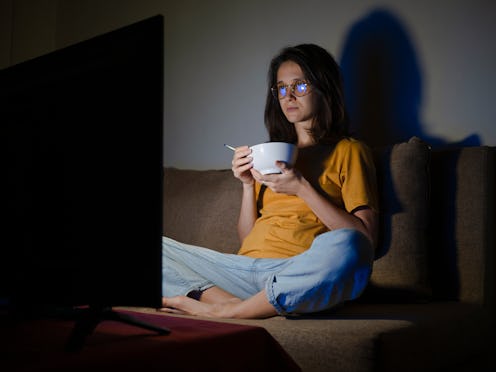Self
Experts Explain Why Marathoning Escapist TV To De-Stress Can Backfire
Here’s how six hours of GBBO compares to other self-care tactics.

From marathoning Bridgerton to hours watching TikTok, escapist pastimes have been hugely popular during the pandemic — because real life, well, isn't great right now. The BBC reported in August 2020 that streaming and internet use were breaking new records. But what is all that escapist TV really doing to your mental health? Being taken away from this world and immersed in another is great in controlled doses, experts tell Bustle, but too much time marathoning your fave shows might make you more stressed in the long run.
"Escapist media can be a great way to help you get through a hard time, if you’re intentional about how you’re using it," therapist Heidi McBain LMFT LPC tells Bustle. She explains that it's a coping mechanism that allows you to forget your own problems for a bit. And the COVID pandemic has made fantasy worlds a really valuable commodity. "People feel emotionally exhausted at this point," Kate Rosenblatt LPC, a therapist with mental health provider Talkspace, tells Bustle. An September 2020 study in Human Behavior & Emerging Technologies identified escapism specifically as a big motivator for people turning to Animal Crossing in quarantine.
But, McBain says, there's a difference between picking up a graphic novel to give yourself a break, and using an endless stream of media to avoid your emotions. "When you’re using media to numb these uncomfortable feelings, when the feelings show up, you most likely use media to force them back down again," she says.
How Escapist TV Or Video Games Affect Your Mental Health
A December 2020 study published in Frontiers on Psychology found that escapist media during the pandemic was linked to poor mental health and higher stress. The more stressed out people were, the more they used Netflix marathons and hours of podcasts to avoid their problems — and, in turn, the less they felt they could cope with their issues. People who just watched an episode or two of The Great British Baking Show, rather than the entire season, were less stressed, and less likely to avoid the source of their worries. If you're feeling very anxious, it could be a good idea to step away from the Autoplay button on your TV for a little while.
This applies to your Xbox, too. Research published in Game User Experience & Player-Centered Design in 2020 found that a bit of gaming after a hard day reduced peoples' work stress and cheered them up. But when they gamed for many hours at a time, those positives fell away. A 2019 study in Journal of Behavioral Addictions also found that people who were having trouble regulating their emotions were more likely to use video games to escape negative feelings, which didn't help mental health in the long run.
How To Use Escapism To Help Your Mental Health
Part of using your Battlestar Galactica obsession to your advantage, Rosenblatt says, is being aware of why you're turning to certain kinds of shows or diversions. "If we find ourselves using escapism to avoid our responsibilities, that can then turn into a negative impact," she says. Experts recommend using those travel shows mindfully. Even if you don't have a lot to do right now except watch TV or movies, it's a good idea to set yourself a schedule: three episodes or hours mentally visiting an island, and then something else, like meditation or cooking.
"When you’re intentionally using escapist media, you’re allowing yourself space to relax in this way for a set amount of time," McBain says. Then, refreshed and happy, you can set about dealing with everyday life.
"It can be helpful to check in with yourself, and honestly ask yourself: 'how am I feeling, and what do I need right now?'," Rosenblatt says. The answer could vary: maybe you're sad and want some feel-good movies to make you feel better, or you're lonely and want human connection, or you're stressed and want to kill some zombies for a bit. That can help you figure out a plan that involves an episode or two of something fun, alongside other things that help you flourish.
McBain suggests setting aside time to process your feelings, to make sure you're connecting with your emotional needs. "If you’re struggling and feeling like you’re using media to numb how you’re feeling, this might be a good time to reach out to a therapist in your area to help you," she adds. They can help you develop strategies for coping that don't just involve Miss Fisher's Murder Mysteries — though it can definitely help.
Experts:
Heidi McBain LMFT LPC
Kate Rosenblatt LPC
Studies cited:
Blasi, M. D., Giardina, A., Giordano, C., Coco, G. L., Tosto, C., Billieux, J., & Schimmenti, A. (2019). Problematic video game use as an emotional coping strategy: Evidence from a sample of MMORPG gamers. Journal of behavioral addictions, 8(1), 25–34. https://doi.org/10.1556/2006.8.2019.02
Eden, A. L., Johnson, B. K., Reinecke, L., & Grady, S. M. (2020). Media for Coping During COVID-19 Social Distancing: Stress, Anxiety, and Psychological Well-Being. Frontiers in psychology, 11, 577639. https://doi.org/10.3389/fpsyg.2020.577639
Kosa, M. & Uysal, A. (2020) "Four Pillars of Healthy Escapism In Games: Emotional Regulation, Mood Management, Coping & Recovery." In Bostan, B. (ed.) Game User Experience & Player-Centered Design, International Series on Computer Entertainment and Media Technology, 63-76.
Zhu, L. (2020) The psychology behind video games during COVID‐19 pandemic: A case study of Animal Crossing: New Horizons. Human Behavior & Emerging Technologies, 3(1), 157-159.